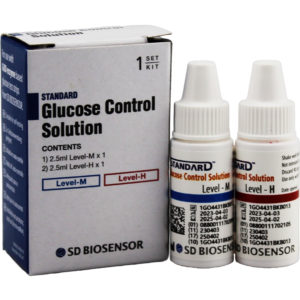For a way to easily and accurately monitor blood glucose levels and manage your Diabetes at home, choose the SD Codefree blood glucose meter from Home Health UK. With a fast test time of only five seconds, monitoring your blood glucose levels has never been easier than with this handy kit.
Please note: If you are based in and delivering your order to a UK address, you must choose the SD Codefree Blood Glucose Monitor Kit for UK customers.
In your order, you will receive one SD Codefree Blood Glucose Meter, which can store up to five hundred test results simultaneously. Two blood glucose meter types are available, one in mmol/L and the other in mg/dL. You can select which meter type you want by selecting the meter from the drop–down menu.
If you are unusure which to choose, you can check which measurement your country uses here.
Additionally, you can expect to receive the following with your blood glucose monitor:
If you are concerned about how easy it will be to replace your test strips or lancets once used, don’t worry. We can offer additional lancets and replacement test strips for your blood glucose meter online at Home Health UK to ensure you remain stocked up and ready to continue monitoring your glucose levels.
As of July the 1st 2021 the rules on VAT for EU sales will be changing. For orders less than £135 (€150) we will display the total price inclusive of the VAT rate. For orders above this amount, you will not be charged VAT and you will be required to pay this when your goods arrive in your country. Read more on the new rules here.
If you’re not sure how important it is for your to self-monitor your blood glucose levels, allow us to educate you.
Many people think that there is no point in self-testing because they believe that they know when their blood glucose levels are too high. Unfortunately, this is often not true, and unless your blood glucose level is very high, how you feel is not always a good or accurate guide to what is happening.
The SD CodeFree Blood Glucose Monitoring System accurately shows your blood glucose level during the test. It involves pricking your finger with the lancing device and putting a drop of blood on a testing strip. The blood glucose monitor will read the result automatically.
Using the self-test diary included in the pack to record your results will help you and your healthcare team determine whether your treatment needs to be adjusted.
Please watch the video produced by Diabetest.co.uk about our NEW SD Codefree Blood Glucose Meter and how to use it efficiently.
All methods of glucose testing involve collecting blood, which is obtained by pricking the skin, usually the fingertip, with a special lancet. However, your fingers may get sore if you have to test frequently.
To combat this, many people choose blood glucose meters which enable you to take blood from other body parts, such as the palm, forearm or upper arm. This is known as alternate site testing (AST).
However, you should always consult your diabetes specialist before testing from other parts of the body.
By shopping at Home Health UK for your blood glucose monitors, you can rely on our experienced team to bring you only the best quality products on the market. We hand-select all of our products and test them to ensure quality and accuracy before presenting them to our customers on the website.
Our expert and experienced team of medical professionals are on hand for our customers to contact seven days a week, year-round, to answer any queries and offer advice.
Do you need more information? We have comprehensive information on diabetes management as part of our wider information bank available at Home Health UK. Our expert team have compiled all the information you must know here to help you with your blood glucose monitor. You can look to the NHS for additional information on blood glucose monitoring.
Alternatively, if you have a question that has not already been answered, don’t hesitate to contact our expert team for help.
Explore our wider collection of blood glucose meters from our full diabetes management range for more options.
For full instructions on how to use these tests click here.
Diabetes daily care Whichever type of diabetes you have, it’s important you come to terms with it. Living with diabetes means you will need to take responsibility for your every day care. The more you understand your condition and how it affects you, the better you will be able to control it. To help, here […]
Type 2 diabetes, also known as non insulin dependent diabetes, is the most common type of diabetes. Type 2 usually appears in older people (over the age of 40) however, as levels of obesity in the UK are rising, more and more younger people are being diagnosed. Type 2 happens either when […]
Gestational diabetes and diabetes in pregnancy Gestational diabetes is a form of diabetes that develops or is discovered during pregnancy. It typically occurs between 24 and 28 weeks of pregnancy (but can develop anytime) after the baby’s body has been formed, but while the baby is growing. It usually disappears when the pregnancy is over. What causes […]
Treatment for Type 1 Diabetes There isn’t a cure for Type 1 diabetes yet so the primary aim of treatment is to keep blood glucose levels as near to normal as possible. The quicker levels are brought under control the better the long-term health prospects. If you have been diagnosed with Type 1 diabetes, you will be […]
What complications can develop from diabetes? Health complications can occur when diabetes is not kept under control. These can range from mild to very serious so it’s very important to routinely test glucose levels and attend regular check ups. Please use the list below to familiarise yourself with common complications, symptoms and ways to prevent […]
What is Type 1 Diabetes? Diabetes (or diabetes mellitus) has two main types: Type 1 and Type 2. In this section we will be talking about Type 1. For more information on Type 2 diabetes, please click here. Type 1 diabetes, also known as insulin dependent diabetes, develops when the insulin producing cells in the pancreas have been destroyed and the body stops producing […]
The National Institute for Health and Care Excellence (NICE) have published an update to the Public Health Guideline on type 2 diabetes. In the UK, there are 3.8 million people living with diabetes, the majority of these have type 2 diabetes. If you have type 2 diabetes you are more at risk of cardiovascular disease […]
Insomnia can disrupt hormones, and may play a role in developing the blood sugar condition, expert says Women who have chronic sleep problems may have an increased risk of developing type 2 diabetes, Harvard researchers report. Problems such as trouble falling or staying asleep, getting less than six hours of sleep, frequent snoring, sleep apnea […]
There are two main types of diabetes: Type 1 and Type 2. Type 1 Diabetes Type 1 Diabetes, also known as ‘insulin dependent diabetes’, develops when the insulin-producing cells in the pancreas have been destroyed and the body stops producing its own insulin. This may be due to a combination of hereditary and environmental factors, […]
You must be logged in to post a review.




Reviews
There are no reviews yet.